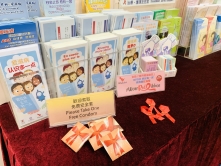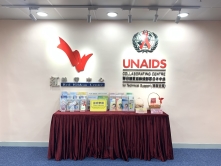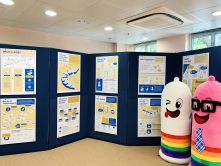Exhibition Board
Women and AIDS
produced in 2014, a set of 12 exhibition boards (height 59 cm, width 41 cm)
Board 1 - Women and AIDS
- The number of newly diagnosed HIV infections is rising every year. A considerable number of people living with HIV, especially females, are unaware of having contracted HIV from their regular partners until they were diagnosed at a late stage.
- Similar to that for other chronic diseases, early diagnosis and management of HIV infection improves survival and quality of life.
Board 2 - What is AIDS?
- AIDS (Acquired Immune Deficiency Syndrome) is caused by HIV (Human Immunodeficiency Virus).
- HIV destroys our immune system mainly by attacking one important type of white blood cells, the CD4 lymphocytes. As the disease progresses, immunity gradually falls, unusual infections and tumours develop and leading to deaths eventually.
- Although there is yet no cure for AIDS, its progression can be controlled with appropriate treatment.
Board 3 - How is HIV transmitted?
-
Sexual contact
- by having sex (vaginal, anal or oral) with an HIV-infected person
-
Blood contact
- sharing injection tools for drug taking
- transfusion of HIV contaminated blood or blood products
-
Mother to child transmission
- infected mothers can also transmit the virus to their babies during pregnancy, delivery and breast-feeding.
Board 4 - Will I become HIV infected?
-
You will be at risk of getting HIV infection if either you or your sexual partner has ever got:
- unprotected sex;
- sexually transmitted infections;
- having sex under the influence of drugs or alcohol;
- shared needles with somebody.
Board 5 - How can I protect myself from HIV infection?
- Say No to illicit drugs and unsafe sex
- Proper use of condom for vaginal sex, anal sex and oral sex
- Don't share syringes or needles
- Clean any wound with disinfectant and cover with waterproof bandage
- Pregnant women should have antenatal check-up for HIV antibody.
Board 6 - Can HIV be passed on to others through social contacts?
- The following social contacts do not transmit HIV (e.g. taking public transport; having meals together; and using public facilities).
- Coughing or sneezing does not transmit HIV.
- HIV is not transmitted through saliva, sweat, tear and urine.
- Mosquito bite does not transmit HIV.
In Hong Kong, more than 70% of HIV infected people contracted the infection through sexual contact.
Board 7 - How can I know if I am HIV infected?
- Most people with HIV do not appear sick, it is impossible to tell if a person has the virus just by looking at, or talking to, him or her. The only way to know is by an HIV antibody test.
- Antibodies are made in your blood when your body is exposed to an infection. HIV antibody test, works by detecting antibodies, can diagnose whether a person has been infected. A positive test result shows that you are infected, while a negative result shown after the Window Period means you are not infected.
Board 8 - What is Window Period?
- Window period is the period between the moment a person get infected with HIV and when the antibody test shows a positive result. The window period of HIV antibody test is 3 months. During that period, an infected person can transmit the virus to other people even though his HIV antibody test remains negative.
Board 9 - HIV antibody test
- A conventional HIV test (blood taking from vein) takes around 1 week for the result, whereas rapid test (finger prick) only requires 20 minutes. Rapid test is therefore particularly useful in some point-of-care setting, e.g. for testing late-presenting pregnant women for emergency labour.
-
Performing HIV antibody test using a rapid test kit
- Finger prick for blood taking
- Put the loop (with blood) into the test kit
- Test result
- Rapid test is only a screening test. Any positive rapid test result should be followed by confirmatory test of venous blood conducted in a laboratory.
Board 10 - What are the benefits of getting HIV antibody test ?
- For you - Antiretroviral therapy can effectively suppress HIV, prevent opportunistic infections, and increase the survival rate. The treatment result is most prominent if a patient is diagnosed and treated early.
- For baby of an expectant mother - with antiretroviral prophylaxis and other effective preventive measures offered by an early HIV diagnosis, the risk of mother-to-child transmission can be reduced significantly. Through counselling, the pregnant woman will understand her physical and psychological capacity to cope with the disease, and reach consensus about continuation with pregnancy.
Board 11 - Services offering HIV antibody test in Hong Kong
- AIDS Hotline of the Department of Health 2780 2211
- Nurse counsellor will make an appointment for you. The testing service is free, anonymous and confidential. - Social hygiene clinic
- provides testing, treatment and counselling on sexually transmitted infections - Community organizations, for example, Hong Kong AIDS Foundation (Tel: 25130513)
- Private doctors
Board 12 - Introduction to AIDS Resources
-
Hotlines (No caller display)
- AIDS Hotline: (Cantonese, English and Putonghua) 2780 2211
- AIDS Hotline: (Tagalog, Vietnamese and Thai) 2359 9112
- AIDS Hotline: (Hindi, Indonesian, Nepali and Urdu) 2112 9980
- Harm Reduction Hotline: (Cantonese, English and Putonghua) 2112 9977
-
Websites
- The Virtual AIDS Office of Hong Kong: This link will open in a new windowwww.aids.gov.hk
- Red Ribbon Centre Website: This link will open in a new windowwww.rrc.gov.hk
Produced by Red Ribbon Centre - UNAIDS collaborating Centre for Technical Support
Regulations for borrowing teaching aids
- The borrowing organisation (borrower) should contact Red Ribbon Centre (RRC) via phone (Tel: 3143 7200) or email (rrc@dh.gov.hk) at least one week in advance for prior arrangement.
- Once approval is given, the borrower can approach the RRC during the office-hours for collection of the item(s).
- The borrower should produce proof of identity (e.g. staff ID card with photograph issued by the borrowing organisation) for completion of loan form before taking away the item(s).
- The borrower should return the item(s) in good condition within 14 days.
- If the borrower cannot return the item(s) within the foresaid period, RRC will reserve the right for further lending of teaching aids.
- In case of any loss or damage of the borrowed item(s), the borrower should notify RRC immediately and pay for the cost afterwards.
- No duplication of the teaching aids is allowed without prior approval of the Department of Health.
- The teaching aids are not allowed for commercial use.
- RRC reserves the ultimate right to lend the teaching aids to any organisation.
- For enquiries, please contact centre staff at Tel – 3143 7200

























